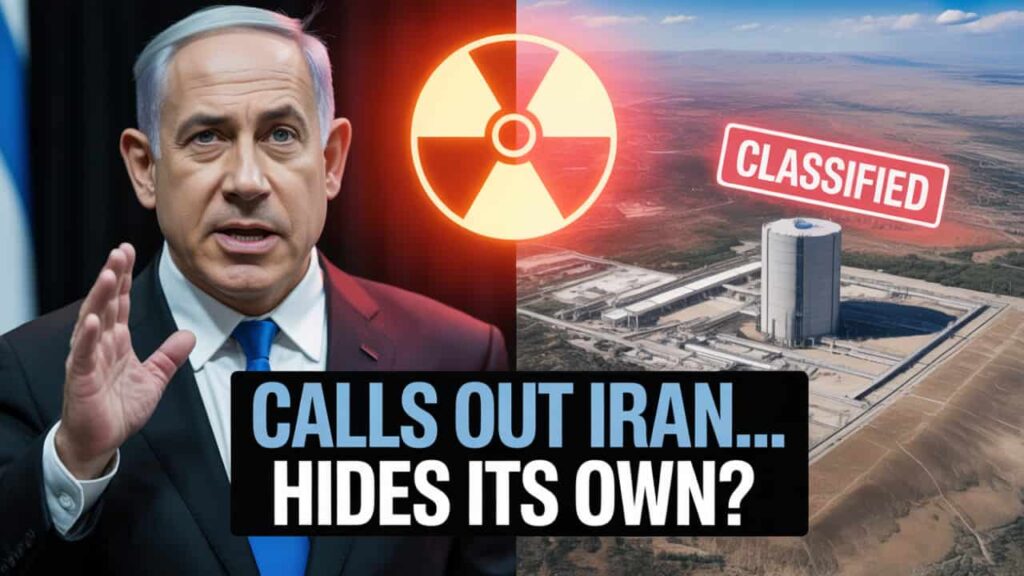The issue of Israel nuclear weapons continues to attract global curiosity and concern—not for what’s said, but for what remains deliberately unspoken. While Israel publicly condemns Iran’s nuclear ambitions, it maintains a long-standing policy of strategic ambiguity regarding its own nuclear arsenal.
Yet mounting evidence suggests that Israel is one of only nine nuclear-armed nations in the world, despite never formally acknowledging it.
Table of Contents
📜 A Historical Pursuit: From Holocaust to Dimona
Israel’s pursuit of nuclear weapons began shortly after its establishment in 1948. In the aftermath of the Holocaust, Israeli leaders saw nuclear deterrence as a safeguard for national survival. In 1952, the Israel Atomic Energy Commission was established, and by 1958, a top-secret facility was under construction in Dimona, in the Negev Desert.
Though the site was presented as a textile plant, declassified U.S. intelligence reports from the 1960s confirmed it housed a plutonium reprocessing plant, essential for nuclear bomb production.
🏗️ Inside the Dimona Nuclear Facility
The Dimona reactor, officially known as the Shimon Peres Negev Nuclear Research Center, has long been shrouded in secrecy. No inspectors from the International Atomic Energy Agency (IAEA) have ever been granted access. According to satellite imagery and analysis by organizations such as the Stockholm International Peace Research Institute, the site has undergone significant upgrades in recent years.
Experts believe Israel may be building a new reactor to enhance its plutonium production capacity, further expanding the Israel nuclear weapons program.
💣 How Many Nuclear Warheads Does Israel Have?
Estimates vary, but most defense analysts agree that Israel possesses at least 90 nuclear warheads. According to the Nuclear Threat Initiative and the Center for Arms Control and Nonproliferation, Israel also has sufficient fissile material to build hundreds more.

Israel’s delivery capabilities reportedly include:
- Fighter jets (such as F-15 and F-35)
- Submarine-launched cruise missiles
- Ballistic missile systems (e.g., Jericho series)
This combination gives Israel credible second-strike capability, a cornerstone of modern nuclear deterrence.
🚫 Outside the NPT Framework
Unlike Iran, Israel is not a signatory to the Nuclear Nonproliferation Treaty (NPT). Signing the NPT would require Israel to open its facilities to international inspection and disarm its nuclear arsenal—steps it has repeatedly refused to take.
The five recognized nuclear states under the NPT (United States, Russia, China, France, and the United Kingdom) are those that tested weapons before 1967. Israel’s undeclared arsenal lies outside this framework, yet it has faced little to no international pressure to comply.
🌍 Global Double Standards and Regional Tensions
While Iran faces international scrutiny, sanctions, and inspections for its uranium enrichment, Israel’s nuclear weapons remain off the radar for most global powers. This perceived double standard has caused friction across the Middle East, with critics accusing Western nations of turning a blind eye to Israel’s arsenal.
“Israel’s silence is a form of strategic messaging,” says nuclear security analyst Alexander K. Bollfrass. “They want to keep adversaries guessing without provoking global condemnation.”
❗ The Vela Incident: A Possible Nuclear Test?
In September 1979, an American satellite known as Vela 6911 detected a mysterious double flash near the South Atlantic. This phenomenon is consistent with a nuclear explosion. Many experts suspect the event was a joint Israeli-South African nuclear test, though the U.S. government never confirmed this.
Former President Jimmy Carter’s diaries referenced a “growing belief” in Israel’s involvement. To this day, the Vela Incident remains one of the most debated moments in nuclear history—and a possible smoking gun in the mystery of Israel nuclear weapons.
🛰️ Modern Upgrades and the Future of Israel’s Arsenal
Recent satellite images from 2017 to 2021 indicate significant construction at the Dimona site. Analysts suggest this may be part of Israel’s efforts to modernize its aging nuclear infrastructure, including the possible development of new warhead designs or delivery mechanisms.
The Israel nuclear weapons program may not be expanding in volume—but it is evolving in sophistication.
❓ Frequently Asked Questions (FAQ)
Does Israel officially have nuclear weapons?
No. Israel has never confirmed or denied possessing nuclear weapons, maintaining a policy of ambiguity.
How many nuclear warheads does Israel have?
It is estimated to have at least 90 nuclear warheads and the capacity to produce significantly more.
Is Israel part of the Nuclear Nonproliferation Treaty (NPT)?
No. Israel has never signed the NPT, unlike most other nuclear and non-nuclear states.
Why doesn’t Israel face inspections like Iran?
Israel avoids inspections by staying outside international frameworks, relying on strong geopolitical alliances to avoid pressure.
Has Israel ever tested a nuclear weapon?
Possibly. The 1979 Vela Incident is widely believed to be a covert nuclear test involving Israel, but it remains unconfirmed.
🔚 Conclusion: Power Without Accountability?
The world remains focused on Iran’s nuclear potential, while the Israel nuclear weapons program continues unchecked and unacknowledged. The Dimona facility, shrouded in secrecy, symbolizes a long-standing policy of deterrence without transparency.
In a region plagued by volatility, the question lingers: Can true nonproliferation be achieved when nuclear weapons are wielded without accountability?
🔗 For more in-depth coverage and exclusive investigations, visit www.documentarytimes.com.